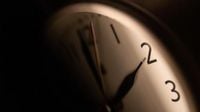As the clocks prepare to spring forward on March 30, 2025, the Swiss Federal Institute of Metrology, known as Metas, is set to play a crucial role in ensuring the precise dissemination of the official Swiss time. Located in Wabern, near Bern, Metas is home to seven highly accurate atomic clocks that generate the official Swiss time, a task overseen by Jacques Morel, the institute's 'Head of Time'. This year, as daylight saving time begins, Morel can rest easy knowing that the transition happens seamlessly without his direct intervention.
"The official Swiss time is determined by the coordinated universal time, which is unaffected by the time change," Morel explained, allowing him to enjoy a peaceful night’s sleep as the clocks move forward.
Since 1967, the second has been defined by an atomic process, making atomic clocks the gold standard in timekeeping. At Metas, these clocks measure time to the 13th decimal place of a second, with each clock costing between 150,000 and 200,000 Swiss francs. In total, there are about 400 to 500 such atomic clocks worldwide, all contributing to the establishment of the coordinated world time.
Interestingly, Switzerland once found itself in a peculiar situation as a 'time island' back in 1980. While neighboring countries adopted daylight saving time, Switzerland rejected it in a referendum, leading to a year of confusion. Jürg Niederhauser, who oversees operations at Metas, recalled the challenges faced by the Swiss Federal Railways (SBB) during that time: "They had to create a special timetable to accommodate the differences in time."
The introduction of daylight saving time in Europe in 1973 was initially a response to the oil crisis, aiming to conserve energy by providing an extra hour of daylight. Switzerland followed suit in 1981 to avoid becoming isolated in time.
As the debate around the time change continues, critics of daylight saving time have raised concerns about its negative impacts on health and animal welfare. Many argue that the shift leads to a phenomenon akin to mini-jetlag, particularly affecting children and the elderly. Studies have shown that the transition can result in increased traffic accidents due to fatigue, a concern echoed by the German Society for Sleep Research and Sleep Medicine.
"Sensitive individuals can suffer from the time change, leading to impairments in performance, fatigue, and sleep disorders," stated a representative from the organization. The Autoclub Europa estimated a rise of up to 30 percent in serious traffic accidents following the spring time change.
Despite these concerns, the European Union has struggled to reach a consensus on the future of daylight saving time. In 2018, the EU Commission conducted a survey revealing that 84 percent of participants favored abolishing the time change altogether. However, member states have yet to agree on whether to adopt permanent summer time or standard time.
Former Commission President Jean-Claude Juncker expressed disappointment at the lack of progress, highlighting the need to avoid a patchwork of different time zones across Europe. "It was never about establishing a single time for all of Europe, but rather about ending the confusion caused by the biannual clock changes," he said.
As discussions continue, the implications of a permanent switch to summer time or standard time remain hotly debated. Proponents of permanent summer time argue it would maximize daylight hours for activities, while opponents warn of potential health risks due to darker mornings in winter.
In Switzerland, the decision on whether to maintain daylight saving time may hinge on developments within the EU, as alignment with neighboring countries is crucial. Jürg Niederhauser noted, "The agreement with our neighboring states is central for Switzerland."
Meanwhile, as the transition approaches, Metas remains focused on its mission to provide the most accurate timekeeping possible. Inside the institute, seven atomic clocks tick away, each one a marvel of precision and technology. Morel described the operation: "Their signals are continuously compared internationally to ensure the utmost accuracy in timekeeping."
In addition to the atomic clocks, Metas houses a unique Cäsium-Springbrunnen (Cesium Fountain), one of only about a dozen worldwide. This remarkable device is so precise that it would take 30 million years for two identical clocks to differ by a single second. However, access to this room is restricted, as even the slightest disturbance could compromise its accuracy.
Despite the technological advancements in timekeeping, the debate over daylight saving time persists, with many questioning its relevance in today’s society. As the clocks move forward, the conversation continues about the future of time changes and their effects on our daily lives.
As people prepare to adjust their clocks, the complexities of timekeeping and the implications of the time change serve as a reminder of the delicate balance between tradition and modernity. The time may change, but the quest for precision remains constant.








